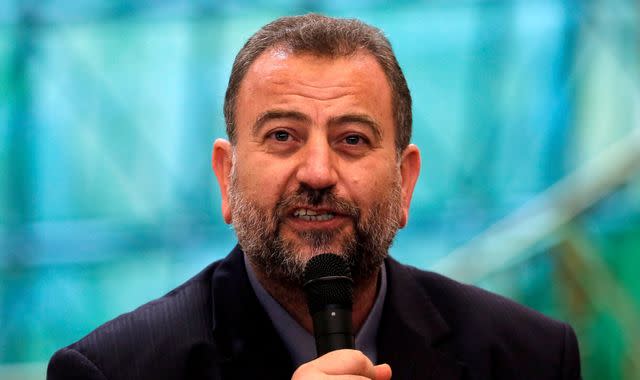Saleh al Arouri: Who was the deputy Hamas leader killed in Beirut explosion?

"I am living on borrowed time," Saleh al Arouri said in August. "I am waiting for martyrdom and think that I lived too long."
Six months later, the senior Hamas official is dead in an apparent assassination in Beirut, an event that threatens to further escalate inflamed regional tensions.
So who was the man who once had a $5m (£3.9m) bounty on his head, and what effect will his death have on the Israel-Hamas war?
Born near Ramallah in the occupied West Bank in 1966, Arouri joined Hamas at its formation in 1987 as Palestinians began their first Intifada uprising against Israeli occupation.
He grew to become a key player in the group, masterminding its operations in the West Bank from exile in Syria, Turkey, Qatar and finally Lebanon after long stints in Israeli prisons.
Within Hamas, he was regarded as a leading advocate of reconciliation between rival Palestinian factions, including Fatah, the party of Palestinian President Mahmoud Abbas which holds sway in the West Bank.
Arouri said there was "no other option" but to engage in what he called comprehensive resistance in the face of expanding Jewish settlements and Palestinian statehood appearing ever more distant.
He helped create Hamas's military wing, the al Qassam Brigades.
Israel has accused him of orchestrating deadly attacks, including the kidnapping and killing of three Israeli teenagers in the West Bank in 2014, an act that triggered a seven-week Israeli assault on Gaza that killed 2,100 Palestinians.
He was also one of the senior Hamas officials behind the group's expansion into the West Bank, where its gunmen have carried out a string of attacks on Israeli settlers over the past 18 months.
Read more:
Strike on Hamas deputy leader is a major escalation
Thousands of Israeli soldiers moved out of Gaza
Living in Lebanon, Arouri helped pull Hamas closer to Hezbollah, the Iranian-backed militant group that holds vast sway in the country.
In early September, Arouri held a meeting with Hezbollah leader Hassan Nasrallah that was attended by Ziad Nakhaleh, the leader of the Palestinian Islamic Jihad group, during which they discussed the situation in the Palestinian territories.
Since the outbreak of the Israel-Hamas war following the 7 October attacks, Arouri kept a low public profile, but the militant group said he was "at the heart of negotiations" over Gaza and the release of hostages.
An influential Hamas commander in life, now his death in a blast in Beirut's southern suburb of Dahiyeh threatens to inflame the conflict even further.
Kareem Chehayeb, a journalist for the Associated Press who covers Lebanon, called the killing of Arouri a "major escalation" that follows months of "very limited and contained" attacks between Hezbollah and Israeli forces.
"There are now fears that this could lead to a wider escalation, though everything is up in the air," he told Sky News.
Alistair Bunkall, Sky News' Middle East correspondent, said Hezbollah may be unable to turn a blind eye to the attack, potentially leading to a significant escalation.


